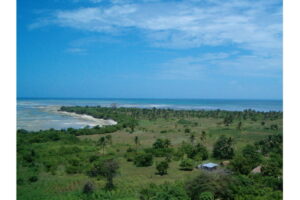Zanzibar. The CCM Secretary of Ideology and Publicity (Zanzibar), Mr Khamis Mbeto Khamis, said the late President Ali Hassan Mwinyi was the architect of the current class of affluent people.
He did so through his decision to open up the country’s economy and allow the private sector to operate and thrive in Tanzania.
Mr Mbeto made the statement on Saturday, March 2, 2024, here, during the farewell ceremony for the late country leader Ali Hassan Mwinyi, who died on Thursday, February 29, 2024, at Mzena Hospital in Dar es Salaam of lung cancer.
The event takes place at the New Amaan Stadium Complex, where United Republic of Tanzania (URT) Samia Suluhu Hassan is leading thousands of mourners in bidding farewell to the fallen great leader of our times.
Mzee Mwinyi is expected to be buried later today at his Manga Pwani home in Unguja on the archipelago of Zanzibar.
Speaking about his acquaintance with Mzee Mwinyi, Mr Mbeto said that when he assumed power, the main economic avenues were driven by the public, but it was the late Mzee Mwinyi who opened doors for the private sector to flourish.
“Many of the tycoons you see today, like Salim Said Bakhresa and others, Mzee Mwinyi is the one who created them by allowing them to engage in business,” said Mbeto.
Mr Mbeto added that when the nation was looking for Mwalimu Julius Nyerere’s successor, three names were brought forward: Rashid Kawawa, Salim Ahmed Salim, and Mwinyi.
He, however, said Mr Kawawa withdrew himself, leaving two names: Mr Mwinyi and Dr Salim, and finally, delegates of the CCM General Assembly picked the former.
“Mzee Mwinyi is a person with a great history, especially in building the economy and assisting the citizens. He had the vision to nurture children to build love,” said Mr Mbeto.
For his part, Morogoro Urban legislator Abdulaziz Mohamed Abood said Mzee Mwinyi opened up the economy of Zanzibar, and during his time, traders began to import various goods, enabling citizens to access essential products.
He said that, serving in the capacity of the President of Zanzibar, Mzee Mwinyi initiated his policy dubbed “Zanzibar is good; let everyone come,” which attracted many traders to engage in various businesses and grow the economy.
“We will remember him as the leader who took us out of isolation; people’s lives were tough, but he opened doors, and the situation improved,” said Abood.
The Civic United Front (CUF) chairman, Prof Ibrahim Lipumba, said when the late Mzee Mwinyi assumed office, there were no foreign reserves in the country, which therefore prompted him to revive the stalled negotiations with global financial institutions.
Prof Lipumba said Tanzania finally managed to restore relations with financial organisations, enabling Tanzania to receive aid that significantly remained the catalyst for opening up its economy.
He said essential goods were allowed to enter the country, with huge opportunities given to the private sector to invest in the country, including the media fraternity, especially established private television radio and television stations.
“When he was president, Mwalimu Nyerere was the CCM chairman, but he managed to make fundamental changes. He persuaded CCM and the government in 1986 to commence an economic transformation journey. He was the one who initiated private sector participation in building the nation,” said Prof Lipumba.
Apart from President Hassan, other senior government leaders attending the national burial event are Vice President Philip Mpango, Prime Minister Kassim Majaliwa, and Chief Justice Prof Ibrahim Juma.
Others are the President of Zanzibar and chairman of the Revolutionary Council, Dr Hussein Ali Mwinyi and his spouse, Maryam Mwinyi; the Isles first and second vice presidents, Othman Massoud and Hemed Suleiman Abdulla and Speaker of the House of Representatives, Zubeir Ali Maulid and his deputy, Mgeni Hassan Juma.
Other leaders are retired URT President Jakaya Kikwete, Zanzibar’s sixth and seventh-phase presidents, Amani Abeid Karume and Dr Ali Mohammed Shein, as well as representatives from Burundi, Namibia and Comoro.














